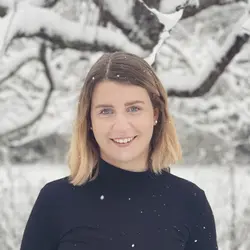Marie Kluge, M.A.

Contact
Obere Karolinenstr. 8, Raum 02.03
D-96049 Bamberg
E-Mail: marie.kluge(at)uni-bamberg.de
Tel: 0951 / 863 - 2033
Address
Otto-Friedrich-Universit?t Bamberg
Professur für Anglistische und Amerikanistische Kulturwissenschaft
Kapuzinerstr. 16
96047 Bamberg
Research
- Crime Fiction
- Women Investigators
- Gender and Femininity
- Victorian Literature and Culture
- Medicine
Current Projects
The Female Investigator in Anglophone Literature and Culture (Dissertationsprojekt)
Academic CV
since October 2024: PhD candidate and research associate, Chair for English and American Cultural Studies (Prof. Dr. Pascal Fischer), Otto-Friedrich-Universit?t Bamberg
2019-2022: Master of Arts Literary Studies (English Studies), Friedrich-Alexander-Universit?t Erlangen-Nürnberg
2020-2021: Exchange student, Universidad de Sevilla, Spanien
2019-2022: research assistant, Institute of General Practice and Chair of English Cultural and Literary Studies (Prof. Dr. Doris Feldmann, em.), Friedrich-Alexander-Universit?t Erlangen-Nürnberg, as well as Institute of English and American Studies, Universit?t Hamburg
2015-2018: Bachelor of Arts English and American Studies, Spanish Studies, Julius-Maximilians-Universit?t Würzburg
Publications
"'[C]ompletely out of the common': Detection and Gender in L.T. Meade's Florence Cusack and Diana Marburg Mysteries." Recovering Lost Voices in 19th-Century British Literature, Vernon Press [forthcoming, with Sophie Bantle]
Memberships
German Assocation for the Study of British Cultures (BritCult)
DACH Victorianists Network
Teaching
Summer Term 25: Female Detectives in Literature and Culture
Works of crime and detective fiction have the overarching potential to question dissonances in the cultural order and values of a specific society especially regarding gender, but also in relation to other categories of social inequality. A popular genre both in its longstanding acclaim within the reading public and in literary classification, crime fiction responds to and reflects social and cultural changes. How gender itself influences crime and our perception of it is manifold, but it most prominently weaves itself into the investigation, the decision-making process, and the detective’s treatment of victims and perpetrators – in short, it leaves its mark in all aspects of the detective’s daily work. In this course, we will dive into the fascinating history of the female detective both on and off the pages or screen. While everybody knows the name and stories of famous male investigators such as Sherlock Holmes or Hercule Poirot (and their creators, Arthur Conan Doyle and Edgar Allan Poe) many of their female colleagues and creators, although highly successful and celebrated in their respective times, are today largely forgotten. We will embark on our own investigative quest by attempting to explore the question of why that is, and we will trace the lineage of the woman investigator through the last 150 years. Furthermore, we will explore how the female investigator exposes and engages with the gendered politics of their profession and in what way the text deals with broader issues of gender and sexuality.
This course is designed to provide an alternative to the wide-ranging myth of the masculinity of the crime and detective fiction genre. To do so, we will look at both the historical development of the figure of the female detective in connection with cultural, social, and political discourses surrounding her. In addition, we will ask the following questions: What can popular genres reveal about contemporary discourses and how do we analyse them productively? How do power structures upheld by gender norms and expectations influence the literary and cultural canon and thus also uphold certain hierarchies?
Winter Term 24/25: Introduction to British and American Cultural Studies
This course offers an introduction to key themes and concepts in British and American cultural studies as an interdisciplinary field of inquiry. Thematically, we will explore issues such as identity, race and ethnicity, gender and sexuality, class issues, the media and visual culture, the American Dream, Brexit, and more. Conceptually, the focus will be on narratives that shaped British and American culture.
The course is designed to provide you with basic skills in cultural studies, with a strong emphasis on reading and discussing various kinds of texts in their cultural contexts. Our primary materials will include short stories, videos and excerpts from novels as well as historical documents, essays, political speeches, photographs, popular songs and films, while several theoretical essays will provide us with a language for discussing changing concepts of culture.
Winter Term 24/25: Theorien der Transkulturalit?t (Friedrich-Alexander-Universit?t Erlangen-Nürnberg)